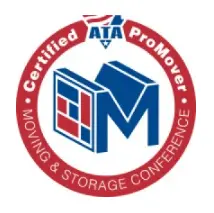
Military Pre-Move Checklist (Courtesy of Moving Heroes)
Things you should do before your move
Six Weeks Prior To Your Move
- Obtain your post office's change of address kit.
- Sort items you don't intend to take to your new location. Plan a date for a garage sale.
- Check school schedules and any enrollment requirements.
- Determine any new drivers' license requirements and transfer of license plates or registration.
- Look for job opportunities for your spouse and children.
- Select a bank, establish accounts, and obtain a safe deposit box.
- Get utility information and phone
numbers. Determine any requirements
to commence service (such as deposits or prepayments).
Five Weeks Prior To Your Move
- Notify schools of your move date. Arrange for records to be transferred to new school system.
- Continue sorting belongings, dividing them into what will go in the van, what will go with you, and what you are giving away or disposing of.
- If you have high value items (like antiques) that you expect to be shipping, obtain an appraisal and get receipts.
Four Weeks Prior To Your Move
- Make a list of everyone you'll need to notify of your move. Include personal and business contacts. Update your contacts/address book.
- Notify your credit card companies of the change of address.
- Hold your garage sale, or donate items to charity.
- Gather all your personal records from doctors, dentists, lawyers, accountants, church, school, etc.
- Call your veterinarian and let them know of your move so you can obtain a copy of your petsí medical records and make sure vaccinations are up to date.
- If you choose to pack yourself, begin packing clearly labeling boxes with name, contents, and room destination.
Two Weeks Prior To Your Move
- Notify the utilities at your current address of your disconnect dates and your forwarding address, and contact those in your new town to begin service.
- Take care of financial arrangements like transferring bank accounts, contents of safe deposit box, notify your broker or investment counselor and settle any outstanding bills.
- If you have a pet, take it to the vet to be immunized and prepared for the journey. (If using and airplane to transport your animal, call the airline for their requirements. They usually need to be seen within ten days of flight.) Arrange for transportation of your pet, and obtain copies of your pet's health records or licenses.
- If you are moving into or out of a high rise building, contact the property manager and reserve the elevator for moving day.
- Cancel deliveries and services like newspapers and trash collection effective by your moving date.
- Consider a sitter for kids and pets on moving day.
One Week Prior To Your Move
- We will Contact you to confirm the date and time of your move.
- Provide moving company with your new phone number or a cell phone number.
- Drain gas and oil from lawn mowers and other gas powered tools.
- Drain oil and gas from all your power equipment.
- Give or throw away perishables you won't eat in the next few days.
- Give any plants you can't take with you to a loving home.
- If you are driving a long distance, have your car serviced.
- Pack your luggage and anything you are taking with you.
- Use only those household items you absolutely must, like towels, sheets, pans, a coffee pot and a few tools; anything else should be ready to go.
- Have us pack everything that you are not taking yourself.
One Day Prior To Your Move
- Empty refrigerators and freezers and keep appliances doors open for at least 24 hours in advance of loading. This will allow the appliance to dry out and prevent the growth of mold.
- Clear walkways and driveways for improved access during inclement weather.
- Isolate checkbook, cash, credit cards, identification cards and keys.
- Separate items not being transported by the moving company.
Day of Your Move
- Put your pets into an isolated room with food, water and bedding. Post a note on the door reminding everyone to keep the door shut so that your pet does not get injured or lost.
- Consider ordering food in or going out to eat.
-
Here are a list of items that you may want to keep handy on the day of your move. Reserve a box for these and other essential items you will need immediately upon arrival to your new home.
| Toiletries | Box cutter or knife |
| First-aid kit | Extension cord, batteries |
| Medications | Basic cleaning supplies |
| Eyeglasses | Snacks |
| Disposable eating utensils | Pet supplies |
| Disposable plates and cups | Bottled water |
| Light bulbs | Flashlight |
| Local phone book | Screwdriver and hammer |
| Map of new area | Trash bags |
| Travel alarm | Canned Goods |
| Cooking utensils | Can Opener |
| Paper towels | Special items for the kids |
Here are a few hints and ideas if you are planning to pack your own items:
- Start EARLY!! If you are moving in the summer, pack your winter clothes 2 months before the move.
- Don't reuse any boxes that have been used many times and are starting to wear.
- Pack all boxes to capacity. (Boxes that are under filled are more likely to be crushed and boxes that are overfilled can tear or fall apart.)
- Boxes should weigh about 25-30 lbs each. It is important to be consistent with the amount of weight in each box. Accidents can happen when a box weighs much more or less than expected.
- Label each box with the name of the corresponding room and contents as soon as you're done packing them. Write directly on the box or print out large computer labels and stick them to the box.
- Don't pack it if you don't need it. The cheapest way to pack and ship something is to NOT do it. Many people go by this rule: If you haven't used it in the past year or so, you don't need it.
- Use the proper packing materials: Sturdy boxes, packing tape, bubble wrap, and packing peanuts can all be purchased and possibly retrieved for free.
- Pack ONE room at a time, labeling each box as you go. DO NOT forget to label boxes containing breakable or sentimental items with "FRAGILE". Keep a list of items packed.
- Empty all drawers of breakable and items that may spill. To safeguard against unnecessary damage, it's a good idea to remove knobs, feet, screws, etc. and place in one container so the parts won't get lost.
Here is a list of items that will help the packing go quickly and easily:
-
Razor knife and/or scissors
-
Note pad
-
Permanent marker
-
Assorted sizes of boxes
-
Packing tape
-
Bubble wrap
-
News wrap
3715 Ramsey Street Fayetteville, NC 28311




